- Home
- Conn Iggulden
The Gates of Athens Page 3
The Gates of Athens Read online
Page 3
‘They’re buzzing like wild bees over there,’ Epikleos said, inclining his head.
Xanthippus looked over the field to the massive stone altar, surrounded by men in armour. Plumed helmets rested on the ground, with shields and spears much like his own. Xanthippus recognised the laughing figure of Themistocles instantly. He was a man who seemed to stand out in any group, perhaps aided by the mass of dark blond hair, tied into a club at his neck. No doubt Agariste would have seen the resemblance to her lion in Themistocles when he left his hair unbound, Xanthippus thought.
To one side of Themistocles, the man Xanthippus respected above all others was, strangely, far easier to overlook. Aristides was as much one of the leaders in Athens as Themistocles, yet his manner was quieter and more thoughtful. Men leaned close to hear when Aristides spoke in the Assembly. It was said that Themistocles would be the first to call for a glorious charge, but Aristides would send it in the right direction. The Athenians valued both men, though the rumour was that they detested one another.
Slaves and runners sprinted to and from that great altar, so that Xanthippus nodded at the image of angry bees. He could see the tribes still forming in squares and ranks, ready to march. He swallowed, his throat suddenly dry.
‘Water here,’ he called.
One of the passing boys skidded to a stop and a skin was pressed into his hands. His bladder squeezed as he drank, making him feel the blood-warm liquid was going straight through. Ten thousand bronze-clad men of Athens was the entire army. It seemed both an extraordinary number – men who had to be equipped and watered and fed – and yet nowhere near as many as they needed.
‘What of Sparta?’ he said as he tossed the skin back. ‘Are they coming?’
Epikleos shook his head, his expression sour.
‘I heard they have one of their festivals. The rumour is they cannot march while it goes on.’
‘Perhaps we should wait, then,’ Xanthippus said.
Epikleos gave a short laugh, though it was a bitter sound.
‘Yes, they would love that, to have Athens wait for them. Can we not go to war without their permission, without them holding our hand? By Athena, no!’ He saw Xanthippus was still sceptical and shook his head. ‘A thousand men of Plataea have come – see them there, with their general, Arimnestos. Why not? We saved them once, when they were threatened. Good men remember what they owe – and pay it back when they can. Good men of Plataea!’ His smile skewed into bitterness then. ‘Yet there are other debts ignored today. No one else stands with us. Still, we know what we face. Our scouts have come back and they are not dismayed.’ He spoke with laughter in his voice, for anyone who overheard him. It did not reach his eyes.
‘The Persians have already landed up the coast,’ Epikleos said, leaning closer. ‘Perhaps twenty thousand, perhaps thirty, with as many oarsmen on their ships. Across the water, they say Eretria is gone – still burning. No, Xan. We need to go today. We need to hit them before they come too far inland. Before they build fortifications. We have one chance to throw them back into the sea. So we’re not waiting for the Spartans. Let them come when we’ve won. I’ll enjoy seeing their faces then!’
‘At least it means no cavalry,’ Xanthippus said.
Epikleos shook his head.
‘They have landed horses from the ships.’
He and Xanthippus shared a glance of worry at that. Any man who had stood in a square, with flutes wailing and drums beating time, knew to fear horsemen on the field. They were just too fast.
‘Where have they landed, then? How far off is it?’ Xanthippus demanded. He could feel his heart thumping, not in excitement or fear, but… anticipation. He would march with his people, with ten thousand hoplites in bronze. They were the elite soldiers of Athens. They would not fail.
Epikleos rested the point of his spear on the dusty ground.
‘On the plain where the fennel grows, by the sea. I think…’
He broke off as the archon – the most senior strategos of the Athenian force – called the tribes to attention. Miltiades was heavily bearded and wore a panelled coat studded with polished nubs of iron, more Eastern in his personal style than Greek. His arms were bare and powerful, with thick black hair on his forearms, and hands that looked like clubs. It was hard to imagine the man caressing a lover. His fists were made to crush and strangle.
Themistocles and Aristides commanded two tribes apiece in the centre, under his orders. As archon, Miltiades had authority over the hoplites of Plataea and all ten Athenian strategoi in battle. His place was the left wing, his own tribe at the heart of it. Xanthippus swallowed. The tribe of Acamantis would be in that wing. Every man there would know those around him, from school and training, from work and the Assembly. They carried shields with the symbols of their houses and their fathers. They could not run, not with those eyes and those spirits watching them. Not with the men of Plataea looking on! There would be no stories of Athenian cowardice to tell all Greece afterwards. This was why they trained. This was why they built fitness with thousands of mornings on the gymnasia running tracks. For days like this.
At the stone altar, Miltiades threw one leg across to stand astride a massive black ram, gripping its head from behind, though it struggled mightily. As Xanthippus watched, precious maps were rolled up and bronze bowls set out for blood and the liver. Two soothsayers stood ready to read the future. Silence settled on them all, so that Xanthippus could hear banners snapping in the breeze.
Miltiades cut the ram’s throat with a sawing motion. As life fled, it kicked out and struck the altar stone, so that all the bowls trembled. Themistocles stepped in to help, gripping the ram’s fleece and guiding the stream of blood into the bowls. After a time, the two men opened the dead animal up in a great gash down the centre. Blood marked them to the elbows and spattered their faces. The soothsayers completed the task of cutting out the shining liver, placing that into a bowl for the most senior of their caste to examine.
‘He will be delighted,’ Epikleos said in a murmur at Xanthippus’ side. ‘He will never have seen such a good omen as this one.’
The words were spoken as the chief priest of Athens pointed to some aspect of the liver’s shape and beamed. The group of generals relaxed and Xanthippus nodded to himself, though he was annoyed at Epikleos for his irreverence. It did not do to mock such things. Xanthippus was reminded again that he had lost the eye of his shield. He found himself muttering a prayer to Apollo that he would keep his sight. The thought of being made blind filled him with fear as death itself could not. Perhaps it was because he could imagine being blind, while the reality of death was still beyond him.
Miltiades offered prayers and any idle talk died away as he began to lead the oath of Athenian hoplites. The men of Plataea stood with their heads bowed and their hands clasped in silent respect. Ten thousand voices spoke the words along with Miltiades, and Xanthippus felt his heart fill.
‘I shall not dishonour my spear and shield, nor leave the line. I will defend the sacred, and return the land stronger than I found it. I shall listen to those who command me – and obey the laws of my city. If anyone attempts to abolish them or threatens me, I shall not give way. I shall never give way. I honour the cults and the faiths. My witnesses are the gods: Ares and Athena, Zeus, Thallo, Auxo, Heracles. My witnesses are the boundaries of the land, and her wheat, barley, olives, figs and vines. My witnesses are those who stand with me today.’
They roared then – and those of Plataea joined them. When the last echoes of that great cheer had faded, Miltiades came to stand with the commanders in the part of the line that would become the left wing. Horns blew and the archon nodded to Xanthippus in greeting. Miltiades would march with them, the hoplites of his city. Scouts and messengers went out on horseback, ahead of the main column. The camp followers formed up behind, with servants and armourers, carts and waterskins and musicians. They would travel light and fast, with supplies to last for a single meal that evening, enough for those who live
d. As for the rest, they would march on foot, together, towards the coast and the plain of Marathon.
3
They marched east, with mountains of ochre and green scrub on their left, winding towards the coastal path as the sun reached noon and seemed to hang. Scouts raced ahead, heading out on foot or riding snappy little animals as wiry as themselves. Those men reported back to Miltiades as archon, then the other strategoi down the column. Xanthippus watched the lads coming in hard, dismounting to walk alongside the generals and pass on all they had seen. It was not skilled work and some were little older than boys. He thought they might burst with excitement or at their own importance. Had he been as young once? Sometimes the memories were so close to the surface, they could have been from just that morning. On days like this, he could hardly remember the innocence, or the confidence and strength he had assumed would be there forever.
Miltiades headed the column, with banners and drummer boys marching alongside him. Weathered and stern in manner, he walked easily enough for a man in his fifties, at least while slaves carried his shield and spear. Even those were an affectation. Miltiades would not hold a battle line with his deme, but remain apart, directing them. The other strategoi would fight in formation, but there had to be at least one cool head on the field.
Another man Xanthippus did not know well walked at Miltiades’ side. Callimachus was the official polemarch, war leader, appointed to the advisory role by the Assembly – their eyes and ears on that march. He wore no armour, Xanthippus noticed. Callimachus strolled along in cloak, tunic and sandals, as if on a country walk. The authority he had been granted had not even survived leaving the Academy field. Without personal experience of war, Callimachus had deferred immediately to Miltiades, almost as if he’d had a choice.
Watching Miltiades bend to listen to his runners, Xanthippus was consumed by the desire to hear the news. He could not stroll ahead. His duty was to stay with the ones he would lead in battle. Of course, Epikleos suggested loudly that he should go and see what was going on, with a hundred others listening. Xanthippus did not reply. The strategoi were not gossiping market traders to be gathering around one of their number. No, he would wait – as Epikleos knew very well he would. He saw the gleam of amusement in his friend and half-cursed him under his breath as he marched on, waiting to whistle to the next boy racing down the line with news. He did not want to be overlooked. Men like Epikleos or Themistocles never seemed to be. They caught the eye.
Xanthippus lowered his head a touch as he strode along, knowing he was glowering. His mood was a dark one, but given what lay ahead, what did they expect? When one of the others offered some comment on the distance they had covered, Xanthippus almost bit his head off, speaking far more harshly than he had intended. He regretted it when he saw the flash of anger on the other man’s face, but he could not take it back and he had learned not to apologise. It did not matter if the men feared his temper, his political power – even the wealth of his wife’s house that could be used against them. As long as they held the line when he told them to stand, or marched into sling-stone and arrow when he told them to advance. That was what mattered. That was what would keep them alive to see the sun set. Marathon was just five hours’ march from Athens, a hundred and sixty stades at most, with each one called out as they put another two hundred paces behind. The road was no more than a dirt track beneath their feet, but it was dry in the summer month of Metageitnion. The longest day of the year was past, but they would still reach the Persian landing place with light enough to act. Miltiades and the strategoi would decide then if they should attack or withdraw to a safe camp.
Xanthippus watched sourly as Miltiades continued to grill the scout walking at his side, as if they had all the time in the world. Did the older man have any idea how the rest of his column yearned to know what was happening? Not that they showed any sign of it, he realised. Discipline was good in the men of Athens. They had all left their homes that morning, just as he had. They wore the same bronze and carried the same spear and sword. Perhaps they understood the stakes just as well. It was a fine thought and it comforted him.
Men like Themistocles and Aristides were in the midpoint of the marching column, where they could turn and form the centre of a battle line. They could not hear reports faster than Miltiades. When Xanthippus glanced back, he thought he saw Themistocles glaring at him, the man’s big frame and lighter hair drawing his attention amongst all the others. Again, Xanthippus did not smile. There was just no room on the march for the petty rivalries of the Assembly. Themistocles was a braggart, but he was a born leader of men in a way Xanthippus found difficult to understand. They responded to something in the big man, as he laughed and confided in them and gripped them by the shoulder. It should have made them contemptuous of him, as the officer trainers sometimes warned of leaders who courted favour with their men. They were all old soldiers, made of gristle and oak and impressed by nothing. Yet they had smiled like boys when Themistocles inspected them; Xanthippus had seen it. It was a mystery. Men needed to see strength, distance, a stern demeanour. Not to be sent staggering by a strategos who carried a wineskin and laughed until the stuff came out of his nose.
Xanthippus shook his head at the thought. Enemies of Themistocles liked to portray him as a buffoon, too often given to levity. The truth was more subtle, Xanthippus believed. His ambition was there to be seen. There was both callousness and amusement in Themistocles, as if nothing in the world had to be taken quite seriously. It was hard to know what to make of such a man. Xanthippus was pleased they would not fight directly alongside one another. Themistocles was a stone dropped into still water. Yet with Miltiades in overall command, the responsibility of the ten strategoi was to obey, to stand and to crush the enemy.
Xanthippus found his throat had dried once again and called for water. The boy who looked around and raced back to him had been close by Miltiades. It seemed natural enough to ask ‘What news?’ as men did when they met in the Agora. The boy flushed with pride as he handed over his waterskin, already flatter than it should be. Water was precious, with so little of it to be found in the land. They would all be gasping like crows by the end of the day. Xanthippus had seen it before.
‘The scout says there are at least ten thousand horse and twice as many men again.’
Xanthippus waved that away, though the men around him stumbled over their own feet as they tried to lean close enough to hear. Large numbers were notoriously difficult to judge – it was hardly a skill that could be taught or practised. Yet Xanthippus had seen single garrisons on the Ionian coast as large as the ranks of hoplites he marched alongside – and those on the very edges of the Persian lands. Men they had captured boasted of heartlands with a million men under arms, of massed regiments each ten thousand strong, numbers so great he could only pray it was a lie, designed to strike fear into the hearts of enemies.
‘Anything else?’ he said, eyeing the lines ahead. Like Themistocles, Xanthippus was taller than most of his countrymen. The gods awarded height to the sons of fishermen and the wealthy, so that it set them apart. Xanthippus could see over their heads to where the scout was making his way back. Another was already with Miltiades, he saw, the lad deep in earnest conversation as he cut shapes in the air with his hands, describing what he had seen.
‘They say the ships came round the coast from Eretria. The scout said some of his mates went up into the hills and saw smoke from the port there.’
Xanthippus nodded, though his heart sank. Lies and wild rumours flew when war was in the offing. Yet it seemed Epikleos had been right. Eretria was around the coast from Marathon, on a vast spit of land across a stretch of open sea. That long branch of ancient hills was part of the natural protections that sheltered Athens from Poseidon and his rages. Eretria was a wealthy port and some thirty thousand had lived there. If the Persians had hit that spot, there would have been horrors beyond imagining, perhaps still going on. Xanthippus clenched his jaw. He hated them, in their arrogance and a
ppalling cruelty. The Persians made him a darker man than he would have been without the visions they brought to torment him. He sometimes thought he had seen too many things to ever sleep well.
‘Take water to those further back, lad,’ he said.
His tone had been harder than he had intended, so that the boy looked confused and hurt. Xanthippus tried to reach out and ruffle his hair, but he ducked away and ran down the line, the waterskin gurgling on his shoulder.
The actual scout had remounted to carry back what he had learned. Full of his own importance, he did not seem to notice Xanthippus until the strategos raised his right hand, calling him over. Even then the man hesitated. When Xanthippus looked over his shoulder, he could see Themistocles was also gesturing briskly for him to approach. The strategos had no patience! They were barely two hours on the march. They hadn’t covered half the distance to the enemy and, at that moment, they were heading closer to the sea to skirt a range of hills that loomed above them all and cast a shadow on their path ahead. Xanthippus cursed when he saw that. Was it another omen? After the missing eye on his shield, he did not want to walk through cold shade just before a battle. It was too much like a premonition of death.
With the sun warm on his neck, he glanced over the sea as it appeared to widen before him – and missed a step, knocking into the man ahead, so that he cursed and stumbled. Some of the others were already pointing and drawing attention to the ships out there. Xanthippus swallowed drily, wishing the water boy had not gone running back.
There was a fleet out on the dark waters. They were not the sleek vessels of Eretria and Athens, nor even the lesser craft of Sparta. For any man who had grown up in a seaport, the ships were instantly strange, alien. The flags that streamed from them bore odd symbols and letters none of them knew. They moved in sluggish beats, with rowers heaving at their stems on both sides. The dimensions too were wrong, with heavy, wide decks. Xanthippus thought they would handle poorly in a swell, though perhaps they avoided the four months of winter when only madmen and suicides ventured out onto the deep. Most traders kept the coast in sight even in the summer months. Yet these were warships, carrying an army. There were just too many for them to be anything else.

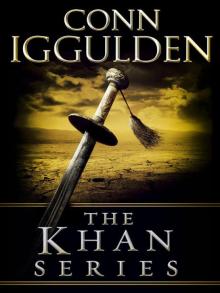 The Khan Series 5-Book Bundle
The Khan Series 5-Book Bundle Tollins 2: Dynamite Tales
Tollins 2: Dynamite Tales Tollins: Explosive Tales for Children
Tollins: Explosive Tales for Children The Field of Swords
The Field of Swords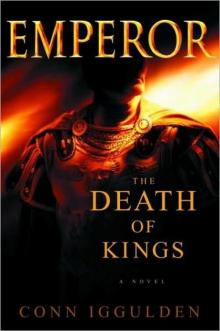 The Death of Kings
The Death of Kings Quantum of Tweed: The Man With the Nissan Micra
Quantum of Tweed: The Man With the Nissan Micra Bones of the Hills
Bones of the Hills Genghis: Birth of an Empire
Genghis: Birth of an Empire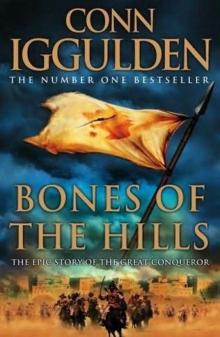 The Gates of Rome
The Gates of Rome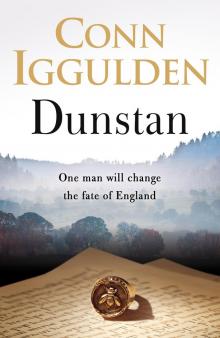 Dunstan
Dunstan Fig Tree
Fig Tree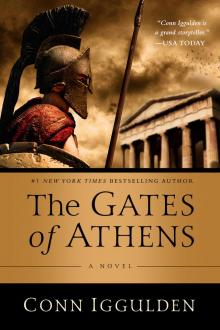 The Gates of Athens
The Gates of Athens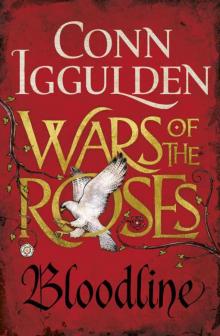 Stormbird
Stormbird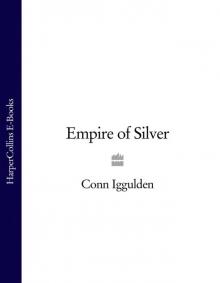 Khan: Empire of Silver
Khan: Empire of Silver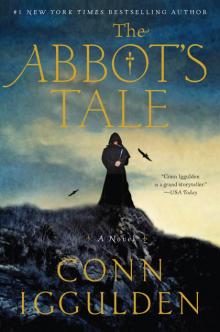 The Abbot's Tale
The Abbot's Tale Gengis: Lords of the Bow
Gengis: Lords of the Bow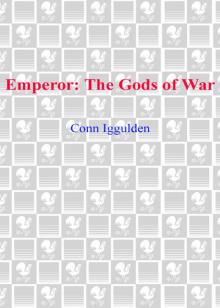 The Gods of War
The Gods of War Blackwater
Blackwater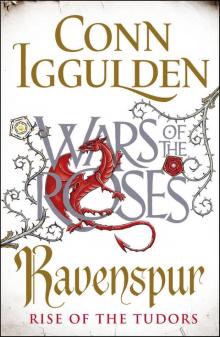 Ravenspur: Rise of the Tudors
Ravenspur: Rise of the Tudors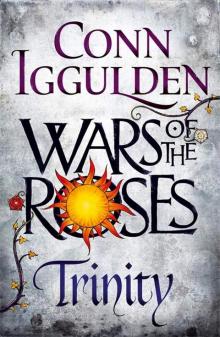 Wars of the Roses: Trinity (War of the Roses Book 2)
Wars of the Roses: Trinity (War of the Roses Book 2) The Gods of war e-4
The Gods of war e-4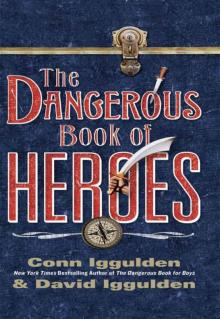 The Dangerous Book of Heroes
The Dangerous Book of Heroes Stormbird wotr-1
Stormbird wotr-1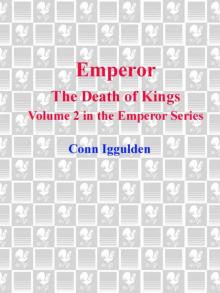 Emperor: The Death of Kings
Emperor: The Death of Kings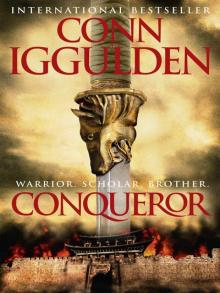 Conqueror (2011) c-5
Conqueror (2011) c-5 The Dangerous Book for Boys
The Dangerous Book for Boys Genghis Lords of the Bow
Genghis Lords of the Bow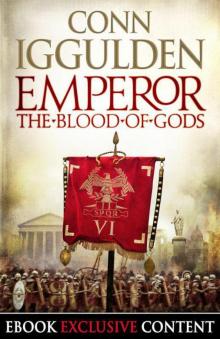 Emperor: The Blood of Gods (Special Edition) (Emperor Series, Book 5)
Emperor: The Blood of Gods (Special Edition) (Emperor Series, Book 5)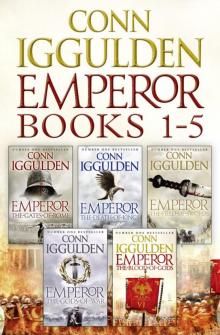 The Emperor Series: Books 1-5
The Emperor Series: Books 1-5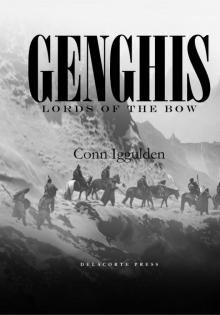 Lords of the Bow c-2
Lords of the Bow c-2 Lords of the Bow
Lords of the Bow Quantum of Tweed
Quantum of Tweed Wars of the Roses 01 - Stormbird
Wars of the Roses 01 - Stormbird Empire of Silver c-4
Empire of Silver c-4 Birth of an Empire
Birth of an Empire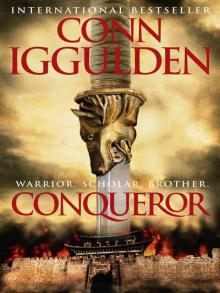 Conqueror (2011)
Conqueror (2011)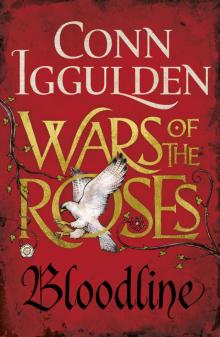 Wars of the Roses: Bloodline: Book 3 (The Wars of the Roses)
Wars of the Roses: Bloodline: Book 3 (The Wars of the Roses) Bones Of the Hills c-3
Bones Of the Hills c-3 Empire of Silver
Empire of Silver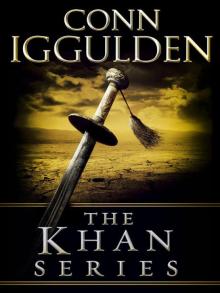 The Khan Series 5-Book Bundle: Genghis: Birth of an Empire, Genghis: Bones of the Hills, Genghis: Lords of the Bow, Khan: Empire of Silver, Conqueror
The Khan Series 5-Book Bundle: Genghis: Birth of an Empire, Genghis: Bones of the Hills, Genghis: Lords of the Bow, Khan: Empire of Silver, Conqueror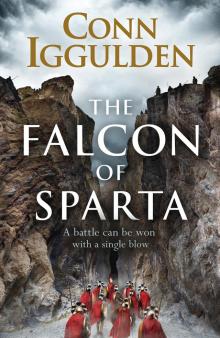 The Falcon of Sparta
The Falcon of Sparta Explosive Tales for Children
Explosive Tales for Children